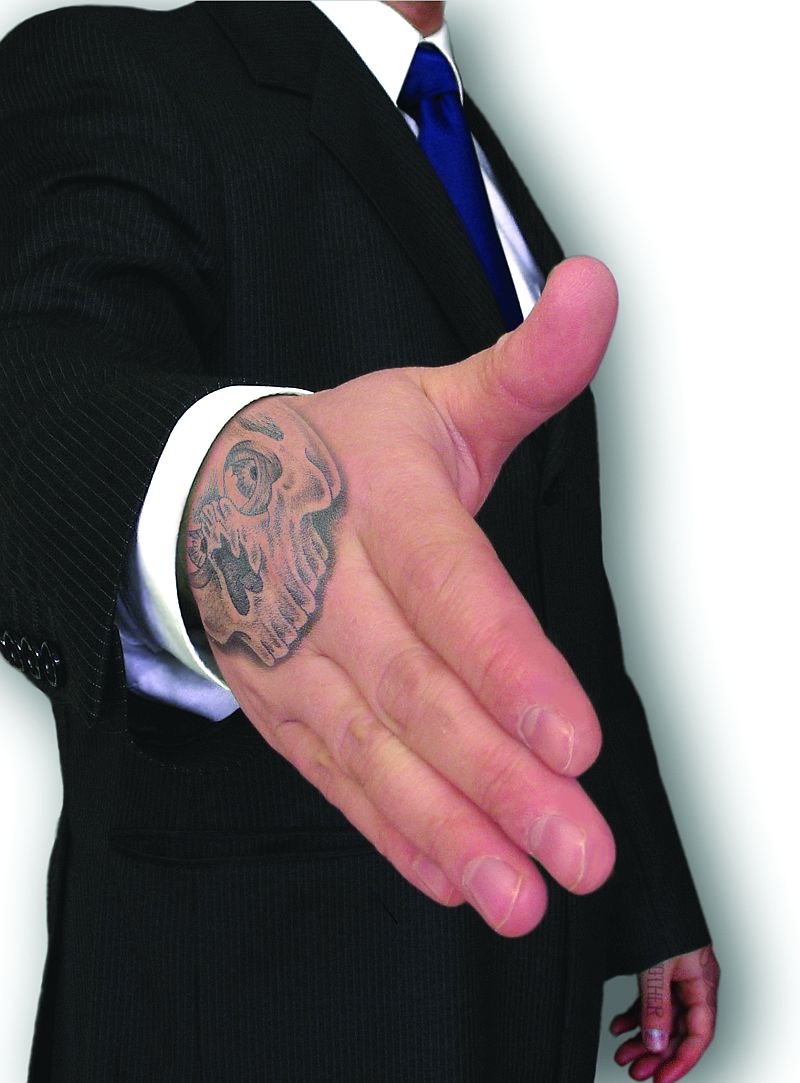Matthew Randall had just finished teaching a class when one of his students approached him. The student pulled out his iPhone and said, “Mr. Randall, I’m thinking about getting this during the summer. What do you think?”
The student showed Randall a picture of a large tattoo, which covered most of the person’s arm in the photo.
Tattoos used to be the mark of rebels and people living on the outskirts of society. Now, a significant number of employees and job applicants have tattoos and, increasingly, it is a matter that must be dealt with as part of the job application process.
According to a 2010 Pew Research poll, 23 percent of Americans have at least one tattoo. The poll also stated that 32 percent of Americans ages 30 to 45 have one or more tattoos.
Many businesses and organizations still frown upon employees showing visible tattoos in the workplace. About 60 percent of human resource managers surveyed in 2012 by the Center for Professional Excellence said a tattoo could hinder a job candidate’s chances of getting hired, an increase from 57 percent in 2011.
Advice about tattoos is something that Randall, who is executive director of the Center for Professional Excellence at York College of Pennsylvania, deals with frequently. The organization helps students prepare for various careers and workplace issues by offering campus seminars, workshops and other services. The center also researches trends and attitudes among employers in different industries.
Randall suggests that those who have tattoos or are considering getting a first tattoo should think about the long-term effects of the decision. That’s the advice he gave to the student with a tattoo picture on his iPhone.
“Look at somebody who you respect who is already 10 or 12 years down the road in their career and say to them, ‘What do people think about tattoos at your level?’” Randall said. “Ask ‘If I get a tattoo, is that going to hurt or hinder me in my career?’”
Randall suggests that students talk to their parents and to a career mentor about how tattoos could shape their future.
Advice for Employers Concerned About Tattoos
Job candidates should find out the policies for tattoos at companies where they are applying, experts say. Employers’ policies can legally range from prohibiting visible tattoos to allowing employees to have visible tattoos in the office, according to Matthew Simpson, an attorney specializing in labor and employment law at Fisher & Phillips LLP law firm’s Atlanta office.
Corporate America is still working out tattoo policies, Simpson said, adding: “We frequently get questions from clients about their policies and about what they can and cannot do with respect to dress codes and tattoos in particular.”
Employers can restrict the display tattoos as long as an organization implements a policy with no discrimination or preference based on race, gender, ethnicity or religious beliefs, he said. “The exception to that would be if an employee had tattoos for a religious reason, in which case there may be a duty to accommodate that employee’s religious beliefs.”
Simpson said that, in his experience, legal cases or legal disputes involving tattoos related to business dress codes are rare.
Tips for Tattooed Job Candidates and Employees

Not everyone agrees that job candidates should conform to corporate policies on ink, however. Joshua Coburn, a 32-year-old marketing professional for Brownells, Inc., in Iowa, thinks it should be the other way around.
Coburn has numerous tattoos that cover about 85 percent of his body. He acknowledges that there are career obstacles for tattooed job seekers and employees, but he believes there are always options for finding work. Coburn said tattooed professionals should seek out companies where the culture is more accepting of tattoos. Consider working in a creative industry such as graphic design or the arts, where tattoos are more accepted, or perhaps becoming an entrepreneur, he advises.
“As much as you need a job, the employer needs an employee,” Coburn said. “As a job seeker, you are there to interview them as much as they are there to interview you. …Do you want to live your dream and work for your dream? Or do you want to live for somebody else’s dream and work for their dream? That’s really what individuals need to ask themselves.”
Coburn added that the corporate world should look past the appearance of tattooed job seekers and employees and consider their qualifications. Often, those with tattoos have plenty of self-assurance and have positive attitudes, he said.
How to Address the Issue
How and when corporate culture’s views on tattoos will change remains to be seen. For job seekers who have visible tattoos and do not want to get rid of them, career counselors suggest that they proceed with certain principles in mind. Avoid being defensive about tattoos during job interviews, Randall said. Tattooed job candidates should give a simple and positive answer if and when an employer brings up concerns about tattoos.
“The savvy job seeker will say, ‘I sense that you’re a bit uncomfortable about the tattoo,’ ” Randall said.
A job candidate should then help bring the interview’s focus back to their abilities, he added, by asking the employer, “Can you help me see how having a tattoo might relate to the job here?”








